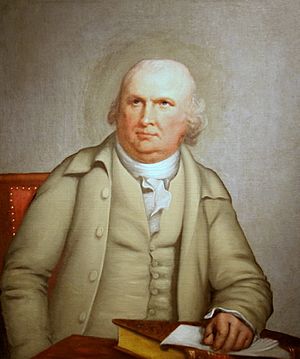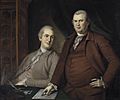Robert Morris (merchant) facts for kids
Quick facts for kids
Robert Morris
|
|
|---|---|
 |
|
| United States Senator from Pennsylvania |
|
| In office March 4, 1789 – March 4, 1795 |
|
| Preceded by | Seat established |
| Succeeded by | William Bingham |
| United States Agent of Marine | |
| In office August 29, 1781 – November 1, 1784 |
|
| Preceded by | Alexander McDougall (Secretary of Marine) |
| Succeeded by | Benjamin Stoddert (Secretary of the Navy) |
| United States Superintendent of Finance | |
| In office June 27, 1781 – November 1, 1784 |
|
| Preceded by | Position established |
| Succeeded by | Alexander Hamilton (Secretary of the Treasury) |
| Delegate to the Second Continental Congress from Pennsylvania |
|
| In office 1775–1778 |
|
| Personal details | |
| Born | January 20, 1734 Liverpool, England, Great Britain |
| Died | May 8, 1806 (aged 72) Philadelphia, Pennsylvania, U.S. |
| Political party | Federalist |
| Spouse | Mary White |
| Children | 7, including Thomas |
| Signature | |
Robert Morris, Jr. (born January 20, 1734 – died May 8, 1806) was an important Founding Father of the United States. He was born in England and became a successful merchant.
Morris served in several key roles during the early years of the United States. He was a member of the Pennsylvania legislature and the Second Continental Congress. He also served in the United States Senate. Robert Morris was one of the people who signed the Declaration of Independence, the Articles of Confederation, and the United States Constitution. From 1781 to 1784, he was the Superintendent of Finance of the United States. Because of this important job, he became known as the "Financier of the Revolution." Many people see him, along with Alexander Hamilton, as one of the main people who created the financial system of the United States.
Contents
Early Life and Business Beginnings
Robert Morris was born in Liverpool, England. When he was a teenager, he moved to the American colonies. He quickly became a partner in a very successful shipping business. This business was based in Philadelphia.
After the French and Indian War, the British government started to tax the colonies more. Morris joined other merchants who were against these new taxes. One example was the 1765 Stamp Act.
Supporting the American Revolution
When the American Revolutionary War began, Morris played a big part. He helped get weapons and supplies for the American side. In late 1775, he was chosen to be a delegate to the Second Continental Congress.
As a member of Congress, he worked on several important groups:
- The Secret Committee of Trade: This group handled getting supplies for the war.
- The Committee of Correspondence: This group managed foreign affairs.
- The Marine Committee: This group oversaw the Continental Navy, which was the first navy of the United States.
Morris was a very important member of Congress until he left in 1778. After leaving Congress, he focused on his merchant business again. He was also elected to the Pennsylvania Assembly. Here, he became a leader of a group that wanted to change the Pennsylvania Constitution.
Leading the Nation's Finances
During the Revolutionary War, the United States faced huge money problems. In 1781, Congress created a new job called Superintendent of Finance. This person would be in charge of all financial matters. Robert Morris accepted this important role.
He also served as the Agent of Marine. This meant he was in control of the Continental Navy. Morris helped provide supplies to the Continental Army led by General George Washington. His efforts helped Washington win a major victory at the Battle of Yorktown.
Financial Reforms and Challenges
Morris made many changes to how the government handled money. He reformed government contracts. He also started the Bank of North America. This was the very first bank to operate in the United States.
Morris believed that the national government needed the power to collect taxes. He thought this was the only way for the country to be financially stable. However, he could not convince all thirteen states to agree to change the Articles of Confederation to allow this. Because the national government was weak and couldn't raise enough money, Morris resigned as Superintendent of Finance in 1784.
Shaping the New Government
In 1787, Robert Morris was chosen as a delegate to the Philadelphia Convention. This meeting wrote and proposed a new constitution for the United States. Morris did not speak much during the convention. However, many of his ideas were included in the new constitution.
Morris and his supporters worked hard to make sure Pennsylvania approved the new constitution. The document was approved by enough states by the end of 1788. The Pennsylvania legislature then elected Morris as one of its first two representatives to the United States Senate.
Later Years and Financial Struggles
President George Washington offered Morris the job of the nation's first Treasury Secretary. Morris turned down the offer. Instead, he suggested Alexander Hamilton for the position. In the Senate, Morris supported Hamilton's economic plans. He also joined the Federalist Party.
During and after his time in the Senate, Morris got into serious financial trouble. He invested heavily in land, which led to a lot of debt. He could not pay back the money he owed. From 1798 to 1801, he was held in a place for people who could not pay their debts. After he was released, he lived a quiet life in Philadelphia until he passed away in 1806.
Images for kids
-
Morris owned what became known as the President's House in Philadelphia
-
A scene from The Apotheosis of Washington shows Morris receiving a bag of gold from Mercury, celebrating his financial help during the Revolutionary War
-
USS Alfred, a ship of the Continental Navy that had previously been owned by Morris
-
The United States following the signing of the Treaty of Paris
-
Map showing the Phelps and Gorham Purchase
-
Statue of Robert Morris in Independence National Historical Park
See also
 In Spanish: Robert Morris (financiero) para niños
In Spanish: Robert Morris (financiero) para niños
 | Chris Smalls |
 | Fred Hampton |
 | Ralph Abernathy |












